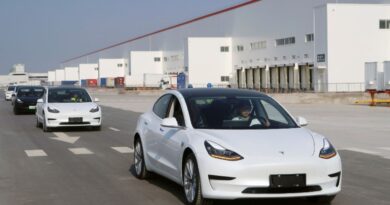Polestar IPO faces a cooling market for EV stocks
Just as Swedish electric vehicle maker Polestar prepares to go public, the financial market is looking uncertain.
When Polestar revealed plans last fall to go public, interest in EV stocks was hot as investors hoped to get in early on the next Tesla.
The exuberance sent some company valuations into overdrive, creating what some see as a stock market bubble. Luxury EV maker Lucid Group commanded a $42 billion valuation after it went public in July, and in November, electric utility-vehicle maker Rivian Automotive’s initial public offering had a $66.5 billion valuation.
“Everyone’s trying to invest in the next Tesla,” Morningstar equities analyst David Whiston said. “But there’s only one Elon Musk and he’s already spoken for.”
But now that Polestar prepares to begin trading on the Nasdaq next month, the EV stock bubble is at risk of popping under the twin threats of rising interest rates and looming economic recession.
Rivian’s stock has cratered — down more than 80 percent from its post-IPO high of $172 in mid-November. Lucid’s stock has shed nearly two-thirds of its value since peaking above $55 last winter.
“The era of easy money is over,” Whiston said. “It’s definitely a more high-risk time to invest in an early EV firm compared to the past couple of years.”
That could be problematic for Polestar, which is relying on the public markets to help it finance its aggressive growth plan.
“Our business plan has been set around a growth plan that needs a certain funding,” Polestar CEO Thomas Ingenlath told Automotive News last year. Without that capital, he said, “we would have to find it somewhere else, or we would have to scale down and change our plan.”
The Volvo affiliate has agreed to a reverse merger with special-purpose acquisition company Gores Guggenheim. The deal, which would take Polestar public, could peg the automaker’s market valuation as high as $25 billion, according to analysts.
The transaction remains on schedule to close next month.
“Polestar has a stable business, with the proof point of delivering thousands of cars monthly,” Ingenlath said in an email last week. “Investors can make their decisions based on a growing, revenue-generating business, not market speculation.”
George Gianarikas, a senior research analyst at Robert W. Baird & Co., believes a shift has occurred in how the world views EV startups.
“Part of it has to do with the change in the market’s mood — part of it with operational issues the companies have had getting things off the ground in a global supply chain crisis,” he said.
Meanwhile, competition from rapidly electrifying legacy automakers is stiffening. Luxury marques BMW and Mercedes-Benz are rolling out a fleet of high-performance battery-powered models.
“Investors are now considering traditional OEMs that they might have previously written off,” Gianarikas said.
Even so, Polestar has something Rivian and Lucid lack — a multiyear record of revenues.
Polestar sold 29,000 sedans globally last year and reported about $1.5 billion in revenue. In April, the company inked a deal to supply rental giant Hertz with 65,000 battery-powered vehicles. The five-year agreement represents more than $3 billion of potential revenue for Polestar.
“To call Polestar a startup is kind of a misnomer,” said Sam Abuelsamid, principal analyst at Guidehouse Insights.
As it scales up, Polestar is leaning on the considerable production, supply chain and retail infrastructure of its parent, Zhejiang Geely Holding, which owns several auto brands, including Volvo Cars.
Volvo will build Polestar’s third model — a midsize crossover — at its U.S. factory near Charleston, S.C., starting at the end of the year. Polestar has said it will not need to add an assembly plant to meet its 2025 volume target of 290,000 vehicles — which is 10 times last year’s deliveries.
Gianarikas said Polestar can “leverage the scale of traditional automakers while simultaneously starting with a clean sheet of paper, which has its own advantages.”
Polestar is likely to have an easier time navigating the global supply chain crisis than Rivian and Lucid, which are building production and supply chain networks from scratch.
“When suppliers have limited components, they’re likely to prioritize their longtime customers rather than the newcomers,” Abuelsamid said.
As Polestar gets set to go public, it might not have timing on its side. But Gianarikas is bullish on the long-term investment prospects of early-stage EV makers.
“There’s always a market for innovative companies,” he said. “People want to fund high-quality innovation.”
Source : Autonews.com




